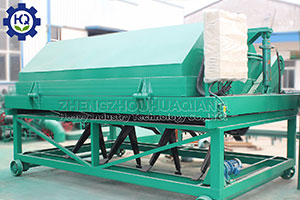
In organic fertilizer production, the fertilizer screener machine is a key piece of equipment. However, it can experience various faults that disrupt normal operations. Timely identification and resolution of these issues are essential.
Reduced Screening Efficiency
1. Screen Mesh Clogging
Organic fertilizer materials often contain moisture and stickiness, which can block screen holes. Clogged holes prevent proper material flow, significantly reducing screening efficiency.
Solution: Clean the screen promptly using vibration, brushing, or high-pressure air blowing.
2. Damaged Screen Mesh
Long-term use or sharp materials can tear the screen. Damaged screens allow unqualified particles to pass through, affecting screening accuracy.
Action: Regularly inspect the screen and replace it immediately if damaged.
Abnormal Vibration and Noise
1. Imbalanced Equipment
Loose parts or uneven wear can cause imbalance, leading to unusual vibrations and noise. This affects stability and fertilizer screener machine lifespan.
Solution: Re-tighten or adjust components. Replace severely worn parts.

2. Faulty Damping Device
Damaged damping components (springs, rubber pads) increase vibration and noise.
Action: Inspect damping devices regularly and repair or replace faulty parts.
Power Transmission Issues
1. Belt Slipping
Loose or worn belts reduce power transfer, affecting operating speed.
Solution: Adjust belt tension or replace worn belts.
2. Motor Failure
The motor is the power source of the fertilizer screener machine.Overheating, short circuits, or burnout can halt operations.
Action: Maintain motors regularly, check temperature and current levels, and repair or replace faulty motors promptly.